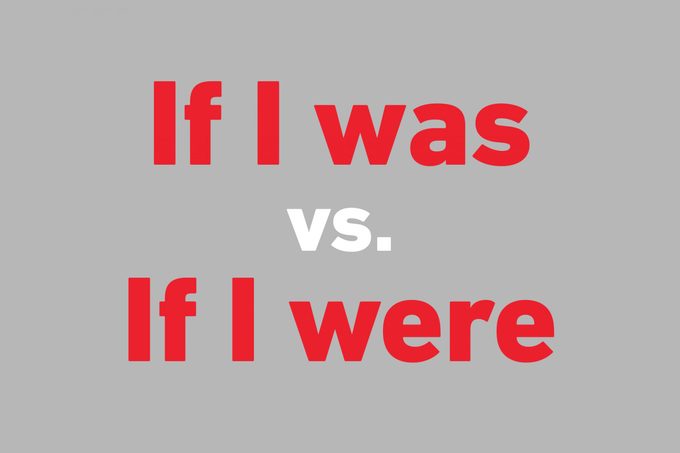If I were you, I’d brush up on this tricky grammar rule to make sure you’re always in the right when it comes to if I was vs. if I were

“If I Was” vs. “If I Were”: Which One Is Correct?

No one ever said grammar was easy. If it were, we wouldn’t spend time trying to make sense of confusing grammar rules while writing a work email. Or should we have said, “if it was easy”? We’ll forgive you for scratching your head—the if I was vs. if I were rule is a complex one.
If I was and if I were are often used interchangeably, even by native English speakers, but which one is correct? The short answer: They’re both right … and wrong. It depends completely on how you’re using the statement.
Read on to find out when to use if I was vs. if I were and get tips for remembering the difference between these two common phrases.
Get Reader’s Digest’s Read Up newsletter for more grammar, humor, travel, tech and fun facts all week long.
When to use if I were
You use the phrase if I were when you are using the subjunctive mood. You may not have heard of this grammatical tense (it’s something English teachers skip when English is your first language), but you probably use it all the time.
The subjunctive is used to talk about hypothetical situations or things that are contrary to fact. You’ll also use it when you are wishing for something.
Take, for example, this sentence: “If I were taller, I would play basketball.” The subject of the sentence is imagining a hypothetical situation in which they are taller and wondering what that would mean for that version of themselves. In their dreamed-up scenario, they’d play basketball.
When to use if I was
You should use the phrase if I was when referring to something that actually happened. You might say, “If I was late for curfew when I was a teenager, my parents grounded me.” This variation is a lot less common, but it does come up.
Quick tip for using if I was vs. if I were
A good trick for deciding which you want to use is to determine if the thing you are talking about actually happened or if it’s something that you’re simply wishing or imagining might have happened. If it really happened, use if I was; if it’s a wish or hypothetical, go with if I were.
| Phrase | If I was | If I were |
| When to use it | Used when referring to something that might have or could have happened | Used when referring to something that is hypothetical or imaginary |
| Example sentence | If I was out past curfew when I was a teen, my parents grounded me. | If I were you, I’d book that vacation before prices get any higher. |
So why does all this matter? Aside from the fact that following these grammar rules will make you sound smarter, it’ll also help others understand what you mean. At the end of the day, grammar is simply a great way to make sure your intention comes across clearly. If I were you, I’d brush up on it!
Why trust us
At Reader’s Digest, we’re committed to producing high-quality content by writers with expertise and experience in their field in consultation with relevant, qualified experts. We rely on reputable primary sources, including government and professional organizations and academic institutions as well as our writers’ personal experiences where appropriate. We verify all facts and data, back them with credible sourcing and revisit them over time to ensure they remain accurate and up to date. Read more about our team, our contributors and our editorial policies.
Sources:
- Merriam-Webster: “If I were (someone)”
- Oxford English Dictionary: “If”






















